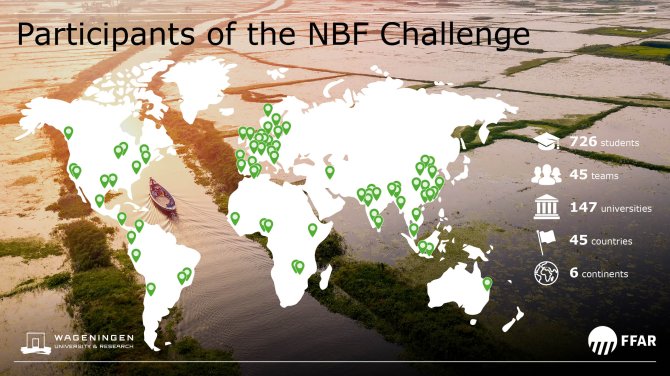
News
More than 700 students worldwide envision a nature-positive future for Bangladesh
Visualize a future in which nature and humans work together to mitigate the effects of climate change and biodiversity loss. That is the Nature-based Future Challenge. Students from all over the world will compete with their vision for a nature-positive future for Bangladesh.
For over twenty years, researchers of Wageningen University & Research have pioneered in the field of nature-based solutions. This an innovative approach to tackle climate change by looking beyond technology: a nature-based solution harnesses nature’s strength and works alongside it. Human and environment can work together for a more robust, climate resilient, biodiversity-positive world.
During the Nature-based Future Challenge more than 700 students from 147 universities on six continents get the chance to explore the potential of the nature-based thinking. Divided into 45 interdisciplinary teams, they will develop their vision for the Bangladesh and its Bengal delta, one of the most dynamic regions in the world. The densely populated area is rich in fertile soil and supports an abundance of wildlife in its mangrove forests. It is also prone to natural disasters. Student teams will propose innovative interventions aimed at mitigating the effects of climate change and averting the loss of biodiversity taking natural processes as a starting point.

The Challenge is an opportunity to meet like-minded students and work together with scientific experts and industry leaders. The winning team will also earn € 9.000.
Nature-based vision for the future
On 29 November the Nature-based Future Challenge kicked off with a hybrid event on the Wageningen Campus. Special guest was Mr. Riaz Hamidullah, the ambassador of Bangladesh to the Kingdom of the Netherlands, who expressed a keen interest in the students visions. Participants joined in from all over the world, hailing from 45 different countries, the biggest groups joining in from China, the Netherlands, and Bangladesh. The Nature-based Future Challenge is thus the biggest WUR Challenge up until now in terms of registrations. Teams are multidisciplinary and multicultural, working together across university lines. One team, Stack, comprised of students from California and Hawai’i, is competing for the second time.
The teams will work towards their nature-based vision for the river delta, which should be biodiversity-positive, ensure food security, enhance climate resilience and have social and economical impact. They will present their plans as attractive and informative visualizations and describe the pathways towards the transformations they propose. A key inspiration here is the NL2120 report, a vision for a nature-based future for the Netherlands that has inspired leading figures in Dutch business and government.
International and local experts
The student teams have quite a formidable task ahead of them. Luckily, the students will participate in design studios and get feedback from more than 20 international and local experts, both learning by doing and learning from the best. The coaches are keen to network with the aspiring changemakers, as previous Student Challenges have shown. Of course, the students also stand to learn a lot from each other, as each team is built up out of students with diverse specialities.
The first milestone of the Nature-based Future Challenge is in February. A jury of Bangladeshi and international experts will judge the first of the teams reports and select the top 20 that will move to the second round of the Challenge. The Grand Finals will take place on 11 June on Wageningen Campus. The Challenge can be followed on LinkedIn and Instagram channels of WUR Student Challenges.
Nature-based solutions is one of the topics that Wageningen University & Research will highlight during climate summit COP28. The session Accelerating Nature-Based Solutions: Developing awareness and evidence for nature positive futures will take place on Sunday December 10th, organized by WUR en WWF Netherlands.